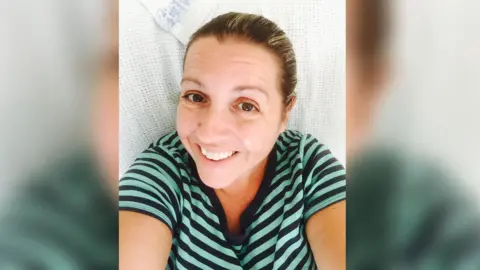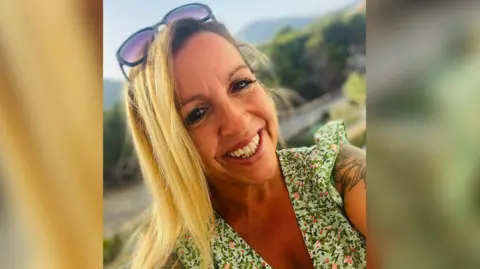A routine cervical screening test saved my life
A mother-of-one is urging people to ensure they have regular cervical screenings, saying that the routine test "truly saved my life".
Ali Alcock from Corwen, Denbighshire, said the test led to her being diagnosed with cervical cancer at the age of 37 back in 2015.
She underwent treatment including a full hysterectomy and has now been clear of cancer for 10 years.
Speaking to BBC Radio Wales Breakfast about the importance of cervical screening, she said: "I know how lucky I am to be a cancer survivor and that's all down to that cervical screening test."
"If I could just get one person to go (for their cervical screening) and make that difference then it means the absolute world to me," she added, speaking during Cervical Cancer Prevention Week.
"Being told I had cervical cancer were the scariest words I could ever hear and, after treatment, I heard the best words I will ever hear when I was given the all clear," said Ms Alcock.
Cervical screening is thought to save around 5,000 lives every year in the UK but between April and August 2024, just 69% of those eligible in Wales came forward for testing.
 Handout
HandoutMs Alcock, a social worker with Denbighshire council, said she was passionate about encouraging people to book in for their cervical screening.
She said: "I just went to my routine cervical screening test and had absolutely no signs and no symptoms but it was then detected that I did have cervical cancer.
"It's the scariest thing ever but I am so glad it got detected so early so I had options open to me.
"I'm absolutely fine now - I'm a 10-year survivor which is fantastic but I might not have been if I hadn't gone for that cervical screening test."
Ms Alcock, who is 47, said she underwent a few different treatments before she was told she would need to undergo a full hysterectomy, which involved the removal of her womb.
The mother-of-one said that at the time she had been planning to have another child and "so it did impact my life greatly, but I'm here to tell the tale and that's all due to it".
She added: "I just want to urge every lady out there to please, please, please - it's imperative that you go for the screening test.
"For those couple of minutes of discomfort or embarrassment it could save your life. It truly did save my life."
Ms Alcock, who has a 31-year-old son, Danny Jones, said she had shared updates about her cancer journey with friends via social media and they had thanked her for prompting them to book in for their screenings.
She said she also shared a video filmed with her dad, Barry Jones, just after she was given the all clear, when both celebrated by bursting into song and her dad gives her a kiss.
She has gone on to raise more than £73,000 for Macmillan Cancer Support through various fundraising events.
 Handout
HandoutWhy is cervical screening important?
Carys Allen from Cervical Screening Wales said: "A lot of people think 'no symptoms, no problems' but unfortunately, that is not the case."
She said cervical screening tested for the presence of human papillomavirus (HPV), which is the virus that causes cervical cancer.
Ms Allen said the virus is symptomless and is "as common as the common cold" and around 80% of people would have it at some point during their life.
What does cervical screening involve?
A sample of cells is taken from the cervix during the test and if any abnormal cells are found then they can be removed or monitored to prevent cancer developing.
All women and people with a cervix aged between 25 and 64 are invited for cervical screening every five years.
The screening tests for the presence of human papillomavirus (HPV).
